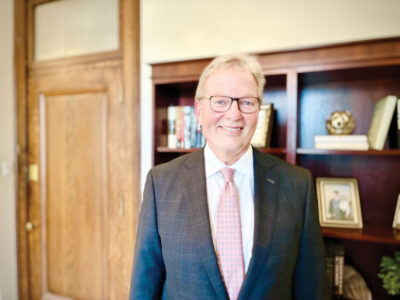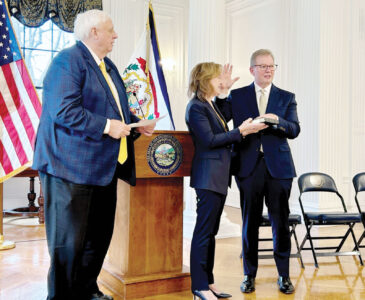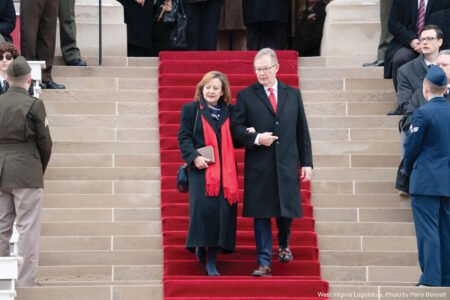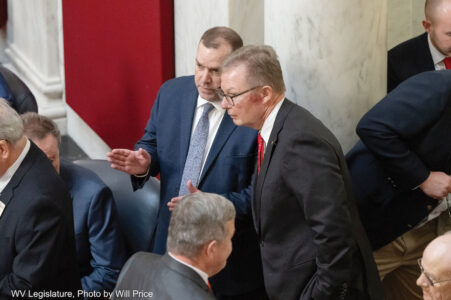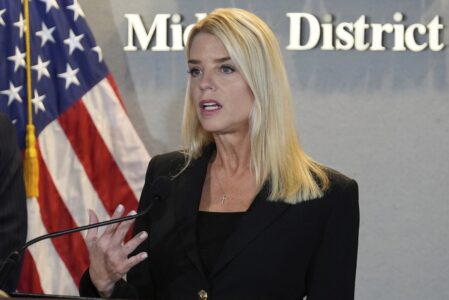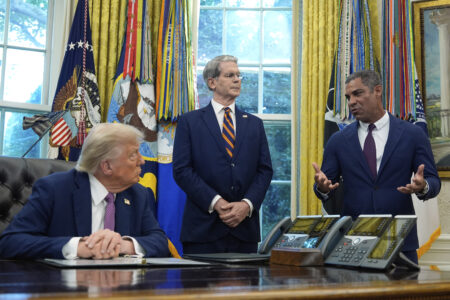Cents and Sensibility: Larry Pack raising profile of State Treasurer’s Office, stays mum on future plans
- State Treasurer Larry Pack said Thursday that he is finding joy in serving West Virginia as its chief financial officer. (Photo by Steven Allen Adams)
- Then-governor Jim Justice, left, administers the oath of office in January to State Treasurer Larry Pack, right, as Pack’s wife, Lisa Pack, holds the Bible. (File Photo)
- State Treasurer Larry Pack and his wife, Lisa Pack, descend the State Capitol Building north-side steps for inauguration ceremonies on Jan. 13. (Photo courtesy of WV Legislative Photography)
- State Treasurer Larry Pack, right, speaks with House of Delegates Chief of Staff Jeff Billings prior to a Jan. 8 joint session of the House and state Senate to hear a goodbye message from outgoing governor Jim Justice. (Photo courtesy of WV Legislative Photography)
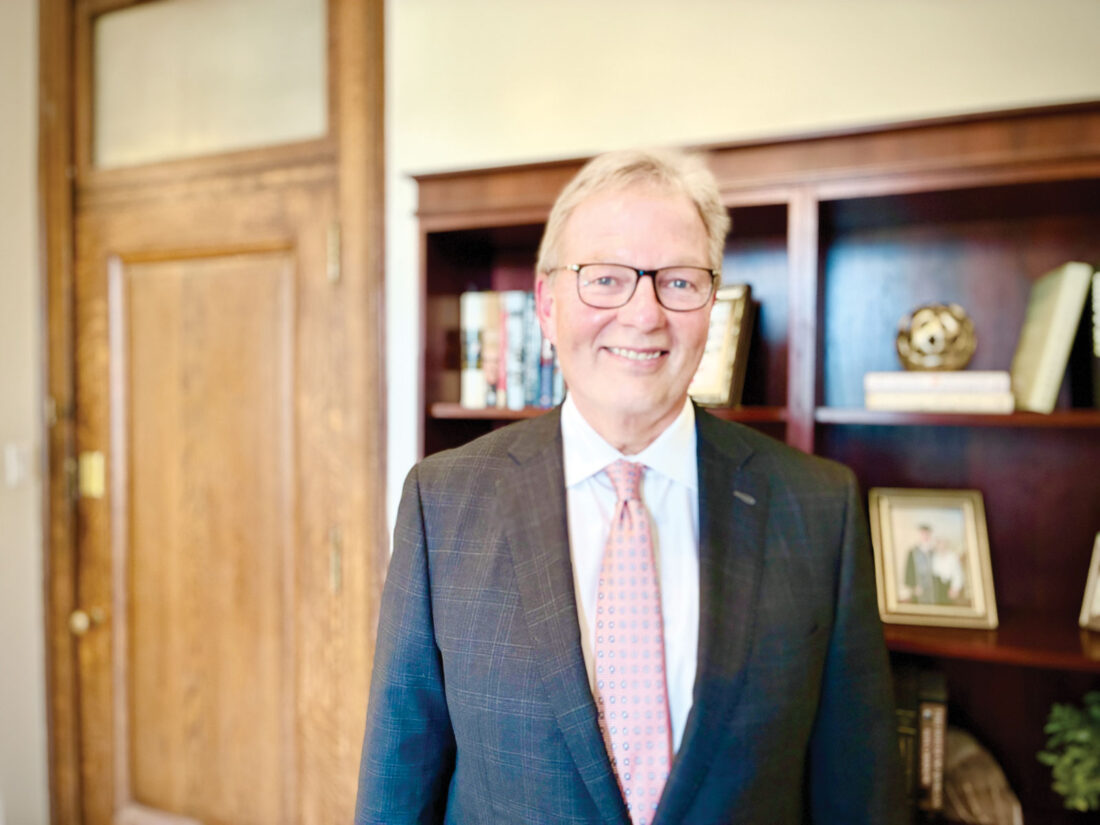
State Treasurer Larry Pack said Thursday that he is finding joy in serving West Virginia as its chief financial officer. (Photo by Steven Allen Adams)
CHARLESTON — Look just about anywhere and you’ll find State Treasurer Larry Pack. From ribbon-cuttings to visits with local government officials, from interviews and op-eds to unclaimed property check presentations, Pack is raising the office’s profile.
But Pack’s activities have also raised questions about his plans for his political future, which could involve a run for governor in 2028, challenging Gov. Patrick Morrisey in a Republican primary.
During an interview Thursday in his offices in the east wing of the State Capitol Building, Pack was not prepared to talk about his future political plans. But he did say that he would continue to use his time in office to talk about issues facing the state and how to make things better.
“I’m very blessed in a lot of ways, but one of the ways is I could retire if I wanted to. God has really blessed me and my family,” Pack said. “But I’ve got a lot of fire in the belly, and in 40 years in the private sector, I’ve got strong views on West Virginia.
“I love West Virginia,” Pack continued. “I’ve got strong views of the direction I think government should go. And I don’t know any way to do anything but just go dead at it.”
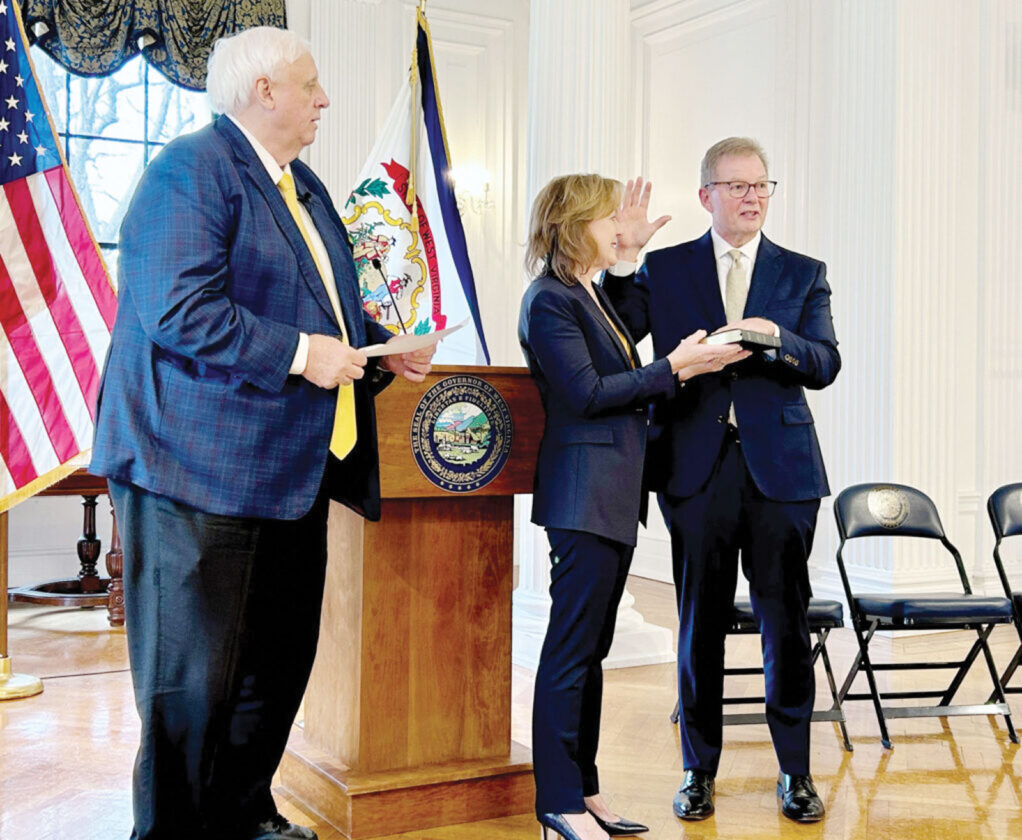
Then-governor Jim Justice, left, administers the oath of office in January to State Treasurer Larry Pack, right, as Pack’s wife, Lisa Pack, holds the Bible. (File Photo)
CHIEF FINANCIAL OFFICER
Chief Financial Officer
Pack won election as state treasurer in an uncontested May Republican primary last year and the November 2024 general election, succeeding Riley Moore as state treasurer. Pack was not slated to take office until inauguration day on Monday, Jan. 13. But Moore needed to resign early as state treasurer to take his oath of office as West Virginia’s 2nd District Congressman.
Pack is a retired businessman with decades of expertise in accounting and senior living. He founded Stonerise, a senior transitional care company with 17 facilities in West Virginia and Ohio that he sold a few years ago. He also co-founded Pack Lambert and Burdette, an accounting firm that later merged with Suttle and Stalnaker.
Pack was elected as a Republican to the House of Delegates in 2020, representing parts of Charleston, South Charleston, St. Albans, Nitro and Dunbar. He was an assistant majority whip and served on multiple committees, including the House Judiciary and Health and Human Resources committees. Pack also is one of the two state representatives on the Republican National Committee.
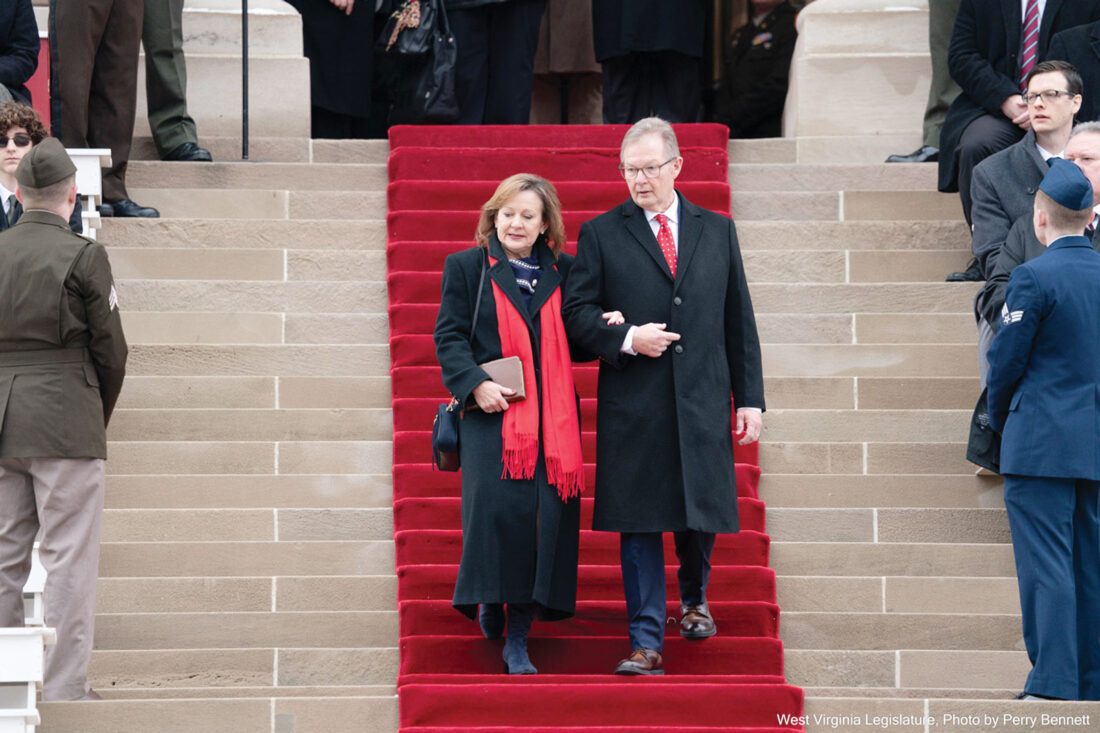
State Treasurer Larry Pack and his wife, Lisa Pack, descend the State Capitol Building north-side steps for inauguration ceremonies on Jan. 13. (Photo courtesy of WV Legislative Photography)
Pack resigned from the House in 2022 to become a senior adviser to former governor Jim Justice, who now serves as one of the state’s two Republican U.S. senators. More than one year ago, Justice also appointed Pack as acting cabinet secretary for the state Department of Revenue, succeeding former Revenue secretary Dave Hardy.
Now, Pack serves as one of six elected members of the Board of Public Works and as West Virginia’s chief financial officer, overseeing cash management for the state. He manages a staff of 142 full-time employees and billions of dollars in state investments. Pack said running a large organization was nothing new for him, but serving as State Treasurer has been a rewarding experience so far.
“I didn’t think it’d be this much fun. I didn’t think I’d enjoy it this much,” Pack said. “I wasn’t sure what to expect, but I didn’t realize I’d enjoy it as much as I have.”
The State Treasurer’s Office receives and disburses state funds; retains all paid checks and bonds issued by the state; collects fees for certain state agencies; and disburses coal, oil and natural gas severance tax collections to local governments, as well as liquor and wine tax revenue, and the fire and casualty insurance premium tax revenue.
The State Treasurer serves as chairman of the Board of Treasury Investments, the Board of Trustees of the West Virginia College and Jumpstart Savings Programs, and the West Virginia Hope Scholarship Board. More than $11 billion in total assets managed by the Board of Treasury Investments, which manages short-term investments by s government agencies. These investments generate hundreds of millions of dollars in interest, which is paid to these agencies.
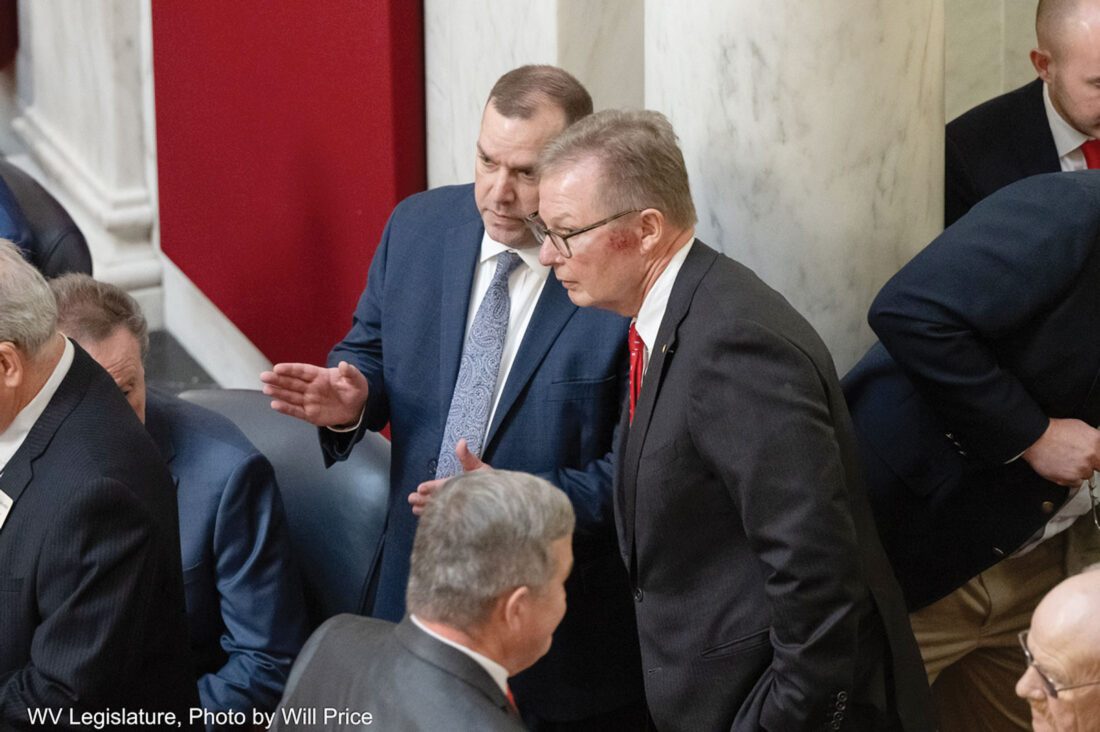
State Treasurer Larry Pack, right, speaks with House of Delegates Chief of Staff Jeff Billings prior to a Jan. 8 joint session of the House and state Senate to hear a goodbye message from outgoing governor Jim Justice. (Photo courtesy of WV Legislative Photography)
“Whether it’s the programs that we’re administering, working and understanding the programs, learning about the programs, that’s been really, really interesting,” Pack said. “I’ve probably spent more time on the Hope Scholarship stuff and the investment side. I think the investment side is maybe one of the most important things that we do to make sure we get the proper earnings and safeguarding assets and so forth.”
More than $40.6 million in unclaimed property was returned to individuals, businesses, and governmental bodies in fiscal year 2025, a new record compared to $28 million during fiscal year 2024. While individuals can go to the State Treasurer’s website to lookup unclaimed property, the office now offers West Virginia Cash Now, an automated matching program to return unclaimed money to individuals proactively.
“In our complex financial society, we’re getting more and more money in. And so we have to work harder and harder to get the money back out,” Pack said. “I think I probably thought that (unclaimed property) was dormant accounts, like old savings bonds accounts, and it’s so much more than that.”
The Jumpstart Savings Program, created by previous State Treasurer and current Congressman Riley Moore, R-W.Va. allows individuals entering trade and vocational programs to save money tax-free. The savings program can be used to pay for tools, equipment, supplies, and other business start-up costs.
The WVABLE Program, which celebrated its seventh anniversary earlier this year, provides individuals with disabilities the ability to save money while not putting their state federal disability benefits at risk. West Virginia Retirement Plus is a deferred compensation plan for state and local public employees to help supplement their pension and Social Security income.
The SMART529 Program offers families a tax-free option to save money back for college for their children, with withdrawals remaining tax-free when used for certain allowable expenses, such as tuition, books, and room-and-board.
HOPES AND FEARS
The Hope Scholarship – passed by the Legislature in 2021 and which went into effect at the beginning of 2023 – gives parents the option to use an equivalent portion of the per-pupil expenditure for their children from the state school aid formula for educational expenses, such as private or religious school tuition, home school, tutoring, learning aids and other acceptable expenses.
“It’s all about giving parents the choice to choose the education that’s best for their children, putting it in the hands of parents,” said Pack, who voted for the Hope Scholarship when he was in the House. “It is something…that we wanted to do for years to be able to return some of the taxpayers’ monies to them for them to make these choices.
“I think the number one responsibility in this building is the education of our children,” Pack continued. “Public safety goes after that and roads goes after that, but the number one thing that we are charged to do is to educate our children and to give them a chance for a better life. Parents choose the setting, but we have to be successful in both (public and private/home education).”
For the 2024-2025 school year, eligible families were able to receive 100% of $5,267 from the Hope Scholarship program if they applied between March 1 and June 15, with the amount decreasing by 25% depending on the time period parents apply during three application windows (June 16-Sept. 16 (75%), Sept. 16-Nov. 30 (50%), Dec. 1-Feb. 28, 2025 (25%). That’s up from $4,921 for the previous school year.
“I’m really proud about (the Hope Scholarship), about the work we’ve done, the transparency that we’ve given to the Legislature, to the Governor, to anybody that asks, about getting that information out,” Pack said. “There’s a lot of interest in that, both statewide and nationally. So, we’ve worked really hard on that to try to make sure we get all the information there.”
Hope’s cost is expected to balloon to more than $300 million annually. The cost of the Hope Scholarship in the fiscal year 2026 budget that went into effect in July is $110 million, up from $45 million in the current fiscal year.
Until the 2026-2027 school year, the Hope Scholarship is limited to children who are eligible to be enrolled in a county school system’s kindergarten program the year the parents are applying, public school students who were enrolled full-time during the school year prior to applying for the scholarship, or public school students enrolled for at least 45 days during the current school year. But beginning in fiscal year 2027 beginning July 1, 2026, the Hope Scholarship could go up by an additional $190 million to more than $300 million.
Pack said it may be necessary for the Hope Scholarship program to be tweaked after fiscal year 2027 depending on how many new families participate in Hope and how much it potentially costs the state.
“All programs get adjusted, and it is the purview of the Governor with Legislature to make some adjustments,” Pack said. “My suggestion is we wait until (Hope is) open so that we know what we’re dealing with, because there are wide variations as to the number of people who take advantage of the Hope Scholarship. We will revise our estimates that’ll come out somewhere in the next few days as to what we think (the number of Hope participants is) going to be for next year.”
While public schools have seen enrollment declines for decades now – decreasing the amount of state school aid going to county school systems, and causing counties to make hard decisions about layoffs, school closings and consolidations – some have pointed to the Hope Scholarship for creating financial incentives for families to pull children from public schools.
Pack dismissed this but acknowledged that conversations need to be had with county boards of education about what changes need to be made given shrinking enrollment while also providing more flexibility for counties to recruit and retain certified teachers.
“Are we going to give these school boards the flexibility to move and to do things? Because these population drops are coming fast, and we make it really hard for them to adjust,” Pack said. “We make it really hard for them to move teachers around. We make it hard for them to move schools around. And classrooms…have a very rigid, one-size-fits-all system whether you’re in Monroe County or you’re in Berkeley County, and those counties are really, very, very different.
“The other thing…that we have to talk about is we have to be able to pay competitive salaries and benefits to our teachers,” Pack said. “You can’t attract and retain these professionals unless we’re willing to pay for it.”
LIFE IS SHORT
One goal for Pack is for the State Treasurer’s Office to have more of a role in how West Virginia government spends money. While the office had a much larger role in the past, much of the office’s authority was removed following hundreds of millions lost by former Democratic state treasurer A. James Manchin from bad investments in the late 1980s.
“I think people expect the state treasurer in everything related to a dollar in the State of West Virginia,” Pack said. “I think we should have a bigger, broader treasurer’s office, not necessary to have a final say on how we borrow money, invest money, spend money, but to be able to be the chief financial officer of the state with some authority to be in the room when these big decisions are made.”
An expanded role would mean providing advice and guidance to future governors, other statewide elected officials, and the Legislature, regarding budgets and finances.
“I do think that a treasurer/CFO could really add value and be a help…but do it not in the way that you are an impediment, but in just the way that you’re providing advice and you’re in the room with the big decisions,” Pack said. “But at the same time, be a cheerleader for West Virginia, for the growth of West Virginia, and be out there in the front lines helping everybody.”
Pack – using his expertise as a certified public accountant, a former large business owner, a lawmaker, a cabinet official, and now state treasurer – feels like he is in the best position to share his thoughts on how the state can improve its labor force participation rate, lower tax rates, embrace an all-of-the-above energy policy, diversification of the economy, and economic challenges facing different regions of the state.
Pack understands that by using his office to speak out on these issues that it looks like he is on the campaign trail for something bigger. But at age 67 and with the recent deaths of friends – Justice Tim Armstead, and businessmen Pat Graney and Andrew Paterno – Pack believes he has an opportunity to speak, and he does not want to waste a moment.
“I’m going to say the things that I think need to be said in a very respectful way to everyone. But I don’t think the state needs a wallflower in this office. Life is short,” Pack said. “While we have the opportunity to have the privilege in this office, we’re going to get out there and we’re going to go for it.
“I have no idea what happens three years from now,” Pack continued. “I didn’t think I was going to go to three funerals this week. But the Lord will take care of that. If it’s meant for us to run for something else, we will. If it’s meant for us to stay here, we will. If it’s meant for us to go to farm in Monroe County. We’ll do that, too. That’s probably my favorite place. But we’ll see what happens.”
Steven Allen Adams can be reached at sadams@newsandsentinel.com.

